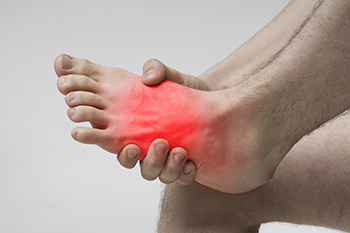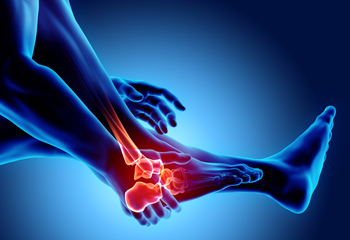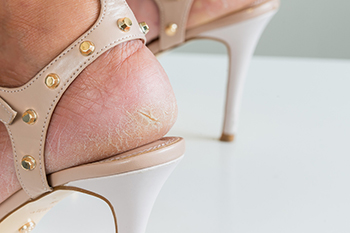
Extensor tendonitis is a common foot issue that causes discomfort across the top of the foot. This condition stems from irritation or inflammation of tendons that are critical for lifting the toes. Repetitive friction and pressure, often due to ill-fitting shoes, are common causes of extensor tendonitis. The primary tendons involved are the extensor hallucis longus, which lifts the big toe, and the extensor digitorum, for the other toes. Extending from lower leg muscles, these tendons cross the front of the ankle, span the upper foot, and attach to toe tips. Their limited protection renders them susceptible to injuries and leads to pain. Overuse or excessive pressure causes inflammation and swelling in these tendons. In time, this can weaken them and cause scarring that reduces flexibility and strength. Risk factors include tight shoes, prolonged weight-bearing, and calf muscle tightness. Pain from extensor tendonitis usually worsens with activity but subsides during rest. Common signs are swelling, tenderness, and bruising. If you are experiencing symptoms of extensor tendonitis, it is suggested that you make an appointment with a podiatrist for a diagnosis and the appropriate treatment options.
Foot Pain
Foot pain can be extremely painful and debilitating. If you have a foot pain, consult with one of our podiatrists from PA Foot & Ankle Associates. Our doctors will assess your condition and provide you with quality foot and ankle treatment.
Causes
Foot pain is a very broad condition that could be caused by one or more ailments. The most common include:
- Bunions
- Hammertoes
- Plantar Fasciitis
- Bone Spurs
- Corns
- Tarsal Tunnel Syndrome
- Ingrown Toenails
- Arthritis (such as Gout, Rheumatoid, and Osteoarthritis)
- Flat Feet
- Injury (from stress fractures, broken toe, foot, ankle, Achilles tendon ruptures, and sprains)
- And more
Diagnosis
To figure out the cause of foot pain, podiatrists utilize several different methods. This can range from simple visual inspections and sensation tests to X-rays and MRI scans. Prior medical history, family medical history, and any recent physical traumatic events will all be taken into consideration for a proper diagnosis.
Treatment
Treatment depends upon the cause of the foot pain. Whether it is resting, staying off the foot, or having surgery; podiatrists have a number of treatment options available for foot pain.
If you have any questions, please feel free to contact one of our offices located in Allentown, Easton, Northampton, and Chew Street in Allentown, PA . We offer the newest diagnostic and treatment technologies for all your foot care needs.

Arthritis can affect the joints in the ankles, feet, and toes, leading to symptoms such as pain, swelling, and stiffness. It can also cause changes in the shape of the feet, making it challenging to find appropriate footwear. Some ways to manage foot arthritis include exercise to maintain joint mobility, weight management if necessary to help reduce pressure on the feet, and properly fitted and supportive footwear to protect the feet. There are various medical treatments available to manage arthritis-related foot pain and stiffness. These may include medications, heat and cold therapy, topical creams, and dietary supplements. If you have discomfort from foot arthritis, it is suggested that you make an appointment with a podiatrist for an examination and treatment options to help you get back to comfortable functioning as soon as possible.
Arthritis can be a difficult condition to live with. If you are seeking treatment, contact one of our podiatrists from PA Foot & Ankle Associates. Our doctors can provide the care you need to keep you pain-free and on your feet.
Arthritic Foot Care
Arthritis is a joint disorder that involves the inflammation of different joints in your body, such as those in your feet. Arthritis is often caused by a degenerative joint disease and causes mild to severe pain in all affected areas. In addition to this, swelling and stiffness in the affected joints can also be a common symptom of arthritis.
In many cases, wearing ill-fitting shoes can worsen the effects and pain of arthritis. Wearing shoes that have a lower heel and extra room can help your feet feel more comfortable. In cases of rheumatoid arthritis, the arch in your foot may become problematic. Buying shoes with proper arch support that contour to your feet can help immensely.
Alleviating Arthritic Pain
- Exercises that stretch the foot can prevent further pain and injury and increase mobility
- Most of the pain can be alleviated with anti-inflammatory drugs, heat, and topical medications
- Massages can help temporarily alleviate pain.
It is best to see your doctor for the treatment that is right for your needs and symptoms. Conditions vary, and a podiatrist can help you determine the right method of care for your feet.
If you have any questions, please feel free to contact one of our offices located in Allentown, Easton, Northampton, and Chew Street in Allentown, PA . We offer the newest diagnostic tools and technology to treat your foot and ankle needs.

In the intricate world of skincare and beauty, cracked heels is a perplexing issue that often plagues many women. These unsightly and often uncomfortable crevices can leave anyone feeling puzzled and frustrated. The culprits behind this phenomenon, however, are not merely superficial. Dry skin, a common cause, occurs as a result of factors such as climate, footwear choices, and lack of proper moisturization. Additionally, prolonged standing or walking can exacerbate the problem, leading to excessive pressure on the heels. Neglecting foot care routines and failing to keep feet adequately hydrated can also contribute to getting cracked heels. While these factors affect individuals differently, a combination of preventive measures consisting of regular exfoliation, wearing appropriate footwear, and moisturizing can help bid farewell to cracked heels, ensuring that each step is a comfortable and confident one. If you would like more information about cracked heels and effective prevention methods, it is suggested that you consult a podiatrist.
If the skin on your feet starts to crack, you may want to see a podiatrist to find treatment. If you have any concerns, contact one of our podiatrists from PA Foot & Ankle Associates. Our doctors can provide the care you need to keep you pain-free and on your feet.
Cracked Heels
It is important to moisturize your cracked heels in order to prevent pain, bleeding, and infection. The reason cracked heels form is because the skin on the foot is too dry to support the immense pressure placed on them. When the foot expands, the dry skin on the foot begins to split.
Ways to Help Heal Them
- Invest in a good foot cream
- Try Using Petroleum Jelly
- Ease up on Soaps
- Drink Plenty of Water
Ways to Prevent Cracked Heels
- Moisturize After Showering
- Skip a Shower
- Keep Shower Water Lukewarm
- Don’t Scrub Your Feet
If you are unsure how to proceed in treating cracked heels, seek guidance from a podiatrist. Your doctor will help you with any questions or information you may need.
If you have any questions, please feel free to contact one of our offices located in Allentown, Easton, Northampton, and Chew Street in Allentown, PA . We offer the newest diagnostic and treatment technologies for all your foot care needs.

